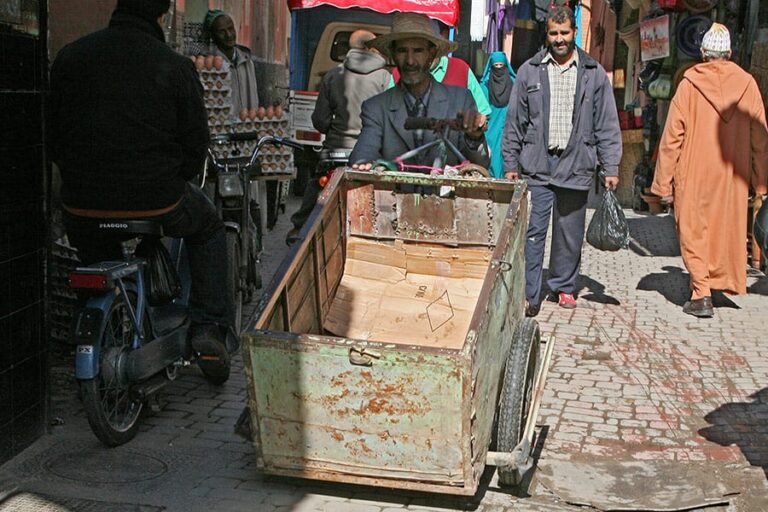Often, the first fear of those who come to live permanently or for an extended winter in Morocco is that they won’t be able to find alcohol or charcuterie easily. Wrong…. apart from small, remote villages and the Ramadan period, alcohol is available almost everywhere in Morocco (but not at any price) and charcuterie is reasonably easy to find.
Other things are harder to find at a reasonable price, and even require regular importation. In fact, if you have any addresses, we’d be delighted to take them (you can suggest them in the directory).
The notion of reasonable price is very important: in fact, you can find everything in Morocco, but when you have to spend four arms for something that would cost barely a finger in Europe, you prefer to fall back on the internet and international deliveries, with almost compulsory passage through customs and a reduction in the tourist reserve, for those who don’t have a convertible dirham account.
Likewise, where you find it counts: Ouarzazate is far more “devoid of everything” than Marrakech, which itself is far less well-stocked than Casablanca.
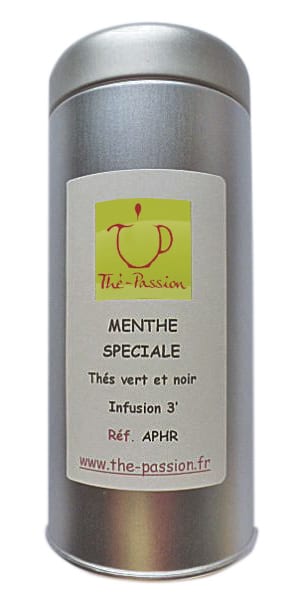
This article was written by several people, after consultation with those around us!
Good black tea
Outside Tangier, the English have never set foot in Morocco, and you can tell. For the five-o’clock tea enthusiast that I am, there needs to be variety and an alternative to the mint, absinthe, thyme and sugar teas that are everywhere. My fault is that I’m a real fan of black and white tea, and I don’t like the ersatz teas you find in supermarkets, which are of limited quality. Hédiard and Fauchon are outside what I call a ‘reasonable price’, and there’s an excellent little shop hidden at the end of a lane in Dar Bouazza, not immediately accessible to everyone, but that’s all I could find.
After testing out a number of online shops in France, I had become a loyal customer of Thé Passion, whose quality of supply is much more stable than that of Palais des Thés, which offers a delicious Tarry Souchong and which also introduced me to exotic things like cardamom tea. And for my Moroccan friends who can’t do without their green tea, a surprising blend of black tea and mint-flavoured green tea. Unfortunately, neither of them deliver to Morocco (and there are no good quality tea shops online, either).
So I’m reduced to having my tea delivered by a small carrier who makes the trip between Paris and Casablanca once a week…
Good coffee
Similarly, good Arabica coffee is a rare commodity. Fortunately, it is still possible to find it, particularly in the Tangier region. Look out for the Dubois brand, which won’t disappoint. The Carrion brand (based in Tétouan) is also of good quality, if you can buy the beans and have them ground in one of their shops.
On the other hand, there are coffee bean merchants in almost every town who will grind your coffee to order, and can even make you a made-to-measure blend. It’s still Robusta, but a good Robusta is better than a bad Arabica.
Authentic essential oils
Most parapharmacies sell ‘oils’, but they don’t have the quality of essential oils. Herboristerie Robert, in Casablanca, offers genuine quality essential oils, but is limited in the number of products it sells. Other shops exist, and the hunt is on for good addresses.
It’s a pity, because Morocco has a very interesting flora, with many local possibilities.
Girls’ stuff
Feminine hygiene items are fairly limited. No doubt the taboo of virginity has a lot to do with this. In short, we can find ourselves in situations of impressive shortages, where it becomes impossible to find tampons in an entire city. (In big cities like Casa, Rabat and Marrakech, you can always find them, but as soon as you move down to towns like Safi, Meknès or even smaller ones, there can be a shortage). As for MoonCups, they are impossible to find locally.
An abundance of books and classical music
Morocco is not a country of readers. In Latin languages, the Casablanca Book Fair is a rare pauper’s fair once you remove the education and religion sections. There are not many bookshops, and they are better supplied in Marrakech. As for classical music…. the supply of quality CDs is as visible as a djinn.
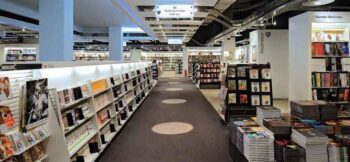
Fortunately, since FNAC opened a shop in Casablanca, and if you’re an FNAC member in France, you can have your order delivered at no extra cost by ordering on the FNAC website (at least, it worked until a few months ago).
Otherwise, there are the solutions shared by all expats. Apart from the big sites, I really like fourtoutici, probably the best collection of French ebooks, with a strong press presence. It’s bad, but ….. There are also sites for English books and magazines.
Paint for boats
Although DIY superstores have really taken off in Morocco, there are still some products that are virtually impossible to find, particularly boat paint. Or you have to go to a professional.
Even if you don’t have a sailboat, if you live on the coast, you’ll have to repaint your facades, doors, shutters and gates regularly, or take a trip to Gibraltar. Finally, there’s still the possibility of moving Azko Nobel, which is the main (and only?) manufacturer/importer of boat paint in Morocco, but in theory it only sells to wholesalers.
Kitchen utensils
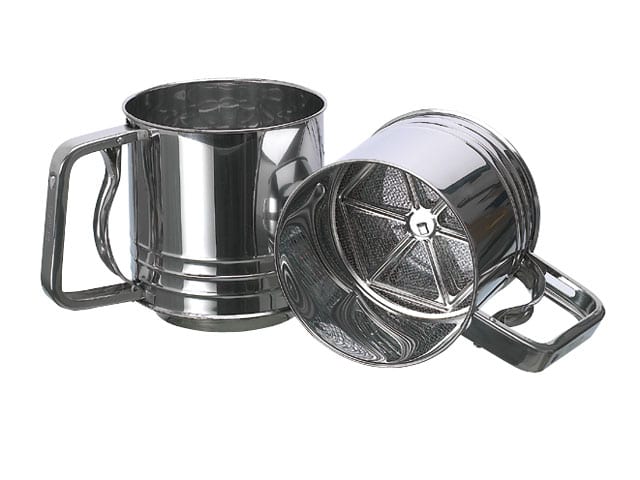
As soon as you move away from traditional cooking, certain tools become hard to find. Marie-Aude went all over Marrakech and Casablanca looking for a simple flour sifter (which you can find at Ikea for a few euros, but Ikea products are still not available in Morocco), things as simple as a scaling knife are impossible to find (even the pros often have them imported from Spain)…
The things you can’t always find
Generally speaking, managing the supply of foreign products has a bit of a ‘surprise package‘ feel to it when you’re in a good mood, and a ‘thirty-year-old Eastern European country‘ feel to it when you’re grumbling, which can be quite unsettling. A product will disappear from the shelves for a few weeks, sometimes a few months, without you really knowing why. A few weeks ago, the range of soya sauces in my supermarket was virtually empty, but now the teriyaki sauces (the ones used to make the delicious caramelised meat kebabs in Japanese restaurants) have disappeared. The item is scheduled to arrive, but its place remains empty, and there’s no way of knowing when it will return.
This supply disruption can affect just about anything imported, especially when there is no Moroccan substitute… which leads to rationing and stockpiling as soon as the product is back on the shelves. Of course, this will further disrupt the logistics of purchasing!
Although Morocco is one of the world’s horse countries, it’s not easy for riders either, as François, from Equi-Coaching in Morocco, explains:
Horse-riding equipment
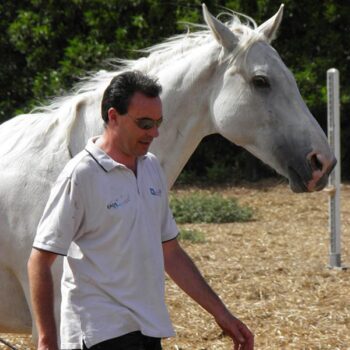
Despite the countless sports shops out there, horse-riding enthusiasts are not well off. There are a few shops, and then there’s Décathlon, but with an ultra-basic choice, limited to one or two brands and only for basic equipment. For horse equipment, it’s even worse. Paradoxically, there aren’t really any saddleries worthy of the name. The big game is therefore to place orders every time a friend travels for a snaffle, a dressage badine or specific equipment (bitless bridles, rope halters, etc.).
Small farming equipment
In the kingdom of the resourceful, it’s hard to find equipment for housing horses or other large animals. Electric fencing or tape, removable stakes, connectors, fittings – none of this is available in the same way as in any rural DIY store. Then it gets complicated, because the equipment is bulky and can be heavy. So we make do as best we can with what’s available locally, but there’s a real shortage. It has to be said that the market isn’t big enough for an entrepreneur to see this as a business opportunity.
Veterinary products
Apart from the very few pharmacies and vets in semi-rural areas, paramedical products for animals other than cats and dogs are non-existent. Whether it’s for external care, food supplements or vitamin complexes, nothing is available apart from the basic essentials, and then some.
Here again, horse owners are hard pressed to find anything other than traditional grandmother remedies, which are often aggressive or even harmful, and of dubious effectiveness. There is a well-stocked pharmacy in Casablanca (in other towns I don’t know), but here again it’s only the well-known conventional products. It’s impossible to find Hoof Stuff or natural worming products! However, if you buy some essential oils (see above), you can come up with a good recipe for treating rotten forks!
For cats and dogs, the situation is slightly worse: you can find frontline and supermarket food, but for everything else you need to go to your vet.
A number of medicines
Dosages are often different in Morocco, as they are in supermarkets, and there can be stock-outs. The essentials are available, but the dosages and presentation have to be changed. Many Moroccans accuse the pharmaceutical industry of delivering under-dosed medicines and prefer to try to buy directly from Europe. As far as fraud is concerned, I don’t know. However, I can testify to the difficulty of finding certain medicines… So if you come to Morocco and need a particular treatment, check that it’s available!
And what about you? Do you have anything you can’t find? On the other hand, do you have any good addresses for things you can’t find?
Don’t hesitate to share in the comments!
 A typo or syntax error? You can select the text and hit Ctrl+Enter to send us a message. Thank you! If this post interested you, maybe you can also leave a comment. We'd love to exchange with you !
A typo or syntax error? You can select the text and hit Ctrl+Enter to send us a message. Thank you! If this post interested you, maybe you can also leave a comment. We'd love to exchange with you !

